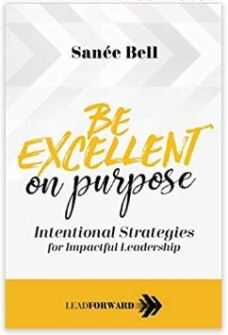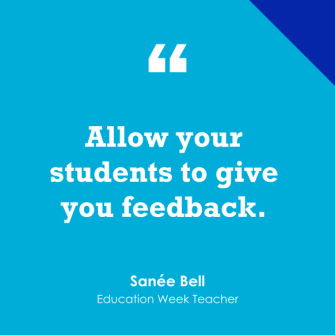
Sanée Bell agreed to answer a few questions about her new book, Be Excellent on Purpose: Intentional Strategies for Impactful Leadership.
Sanée Bell, Ed.D., is a middle school principal, author, and speaker who resides in Houston. Dr. Bell recognizes her impact as a leader and uses her role to inspire, motivate, and empower others. Sanée shares her thoughts on leadership on her blog saneebell.com and via Twitter @SaneeBell.
LF: Why did you decide to write this book, and can you describe your vision for how people would use it?
Sanée Bell:
I have an athletic-coaching background, and so much of my experience as an athlete and coach are evident in the way that I lead and attack life in general. Being a coach in sports easily translated into supporting and coaching others in the education field. I wrote this book because I often find myself coaching other teachers and leaders through experiences that I have faced in my career. Writing a book helped to expand my reach and share my voice with others.
My vision for how people will use my book is that it serves as a resource that is referenced often. I want the personal experiences I shared help readers attack the obstacles and challenges they face. The reflection section in the book gives readers the opportunity to take personal inventory on the topic being discussed in the chapter. Hopefully through my experiences, and their personal reflection, they will be able to discover more about who they are as an educator.
LF: You discuss sort of a road map that people can use to become better in their chosen field, and the book’s ideas make a lot of sense. I can see how people who have intrinsic motivation in that direction can use the different strategies you write about to improve. What are some suggestions you have for how educators can use those strategies to promote that appetite for change among students who, for whatever reason, might not at least show that desire on the surface?
Sanée Bell:
Recently, I was talking with a student who has a track record of making choices that ultimately end as unpleasant experiences. He shared with me that he was looking forward to starting the new school year, especially being able to have a fresh start with teachers, assistant principals, and coaches. I asked him to visualize what success would look like for him at the end of the year. He paused and then he began to share what he visualized. I then asked him what he was going to intentionally do to make his vision a reality. He began to tell me the specific actions he was going to take, which were all key steps toward realizing his goal. Knowing this student has the tendency to fall into a pattern of poor choices, I have followed up with this student weekly to check his progress toward his stated action plan. Although he has had some wins, he has had some setbacks. By the middle of the fall semester, if I don’t stay connected with this student, I can see his plan completely crumbling.
Teachers can use this same process in their classroom with their students. We must help students visualize success and show them how to realize success by teaching them how to set attainable short-term and long-term goals. People want to be successful. Success means you are winning on the scoreboard. We sometimes just have to help students understand what it means to win by showing them that they do have more control over their circumstances than they realize. Even when the plan does not go as expected, we must teach students how to overcome setbacks. Start small by helping students visualize what success looks like and feels like. Help them set intentional actions that will help them meet their goal, and be sure that you work with them to monitor their progress. Be their accountability partner and celebrate the small wins.
LF: The book has a chapter titled “Be a Champion for Equity.” What does that look like for an educator, and why should it be such a high priority?
Sanée Bell:
During the writing process, there were times when words flowed more freely than others. Writing the chapter on equity was one of those moments of free flow. A champion for equity is an educator who fights on behalf of students and communities from marginalized groups. Those who are champions for equity understand that for some students education is the only shot they may have at making a better life for themselves. Furthermore, the same educational experiences that each educator would want for their own personal children, or children who are close to them, should be what they want for other people’s children. If we all work with that same fervor in our spaces, inequity wouldn’t exist because there is no way educators would accept status quo for their own personal children. Educators who not only bring attention to policies, practices, and beliefs that perpetuate inequity but who also ensure their daily practices, beliefs, expectations, and level of support meet the needs of students from all demographic backgrounds are Champions for Equity.
Recognizing inequity is not enough. If we see it, it must be called out. Educate others and stay committed to ensuring all students receive an exceptional education in a safe, supportive learning environment, regardless of their demographic or racial background. Hope must lead to courage. Courage must lead to intentional action, and intentional action will lead to change. We must move beyond the conversation.

LF: You have another chapter on “student voice.” That term is used a lot these days in education circles. How would you define it, and what can it look like in the classroom?
Sanée Bell:
Student voice means allowing students to share their thoughts and feelings about their experiences about the school or classroom. If their voice is not part of the decisionmaking in our schools, whose needs are we working to meet? Think about your experience in a store or restaurant. Many businesses have comment cards or surveys they give customers so they can get feedback. If consumers are unhappy, they speak with a manager. Why should schools be different for our students? Their voice matters, because ultimately they are the end user of the experience we are providing. We need to stop assuming that as adults we know everything about what our students are thinking and what they need. While our wisdom rules in many areas, we still need to involve our students in the conversation.
Allow your students to give you feedback. Using surveys is a great way to gather information. Give students the opportunity to give you feedback about your course, the classroom, your teaching style or strategies. Don’t take the feedback personally. It is not about you. It is about the experience and support you are providing. If you need to change to meet the needs of your students, that is your job. Take the feedback and make adjustments. Try using focus groups as well. Pull a small segment of students that is a cross-representation of your class. Talking with these students in a small group may give you more in-depth information. While facilitating this focus group, listen to learn—not to respond. Ask all students to speak freely in a respectful way. Establish ground rules so they understand the parameters.

LF: What are three strategies from the book that educators could apply tomorrow?
Sanée Bell:
Know your why. As educators, we are charged with so much when it comes to educating today’s youth. The job can be taxing, and often we find ourselves overwhelmed with all of the task. What keeps me grounded and motivated to always do my best work for kids is reconnecting with my WHY. Your WHY is your purpose, and your purpose is what fuels your commitment and passion. It is what motivates and inspires you to keep moving forward for kids. I challenge you to get reconnected to your WHY or take the time to identify your WHY.
Practice self-awareness. What we produce each day has everything to do with what we think, what we feel emotionally, and what we believe about ourselves and others. Practicing self-awareness means monitoring those aspects of our inner self and being conscious of how we impact our settings and those around us. This helps us to reflect on our actions to determine if we are a help or hindrance to the work that our organization is seeking to produce. Self-awareness helps us to work through difficult problems with colleagues or develop strategies to overcome difficult challenges. Being able to be self-aware is what allows us to be free to reflect with ourselves honestly so that we can make adjustments to self before focusing on others.
Learn how to receive feedback. One of the hardest things for many, if not all people, is to receive feedback. Even those who have a strong sense of self grapple with receiving feedback. Learning how to hear what others are saying about you as a person or your ideas can be difficult. Try assuming that people are coming from an honest place. Take a moment to hear what they are saying before completely shutting down. Practice self-awareness by reflecting on the words, not the delivery of the message. Be honest and find the nuggets in the message that will help you grow. Receiving feedback well takes practice, so open yourself up for opportunities to receive feedback. Allow others to give you feedback about your teaching or leadership style. Reflect on the feedback you receive and think about what changes, if any, you want or need to make in order to grow in your role. Begin this practice by asking those who you trust and value their opinion to give you feedback on an area of your teaching or leading.
LF: What haven’t I asked you about that you’d like to share?
Sanée Bell:
It is important that educators understand that Being Excellent on Purpose is about a mindset and intentional actions. If we all strive to Be Excellent on Purpose, there will be no room for average or mediocrity in our circle. Excellence and mediocrity cannot co-exist. Seeking excellence is not a final destination. It is a commitment to continuous improvement and personal growth.
LF: Thanks, Sanée!
